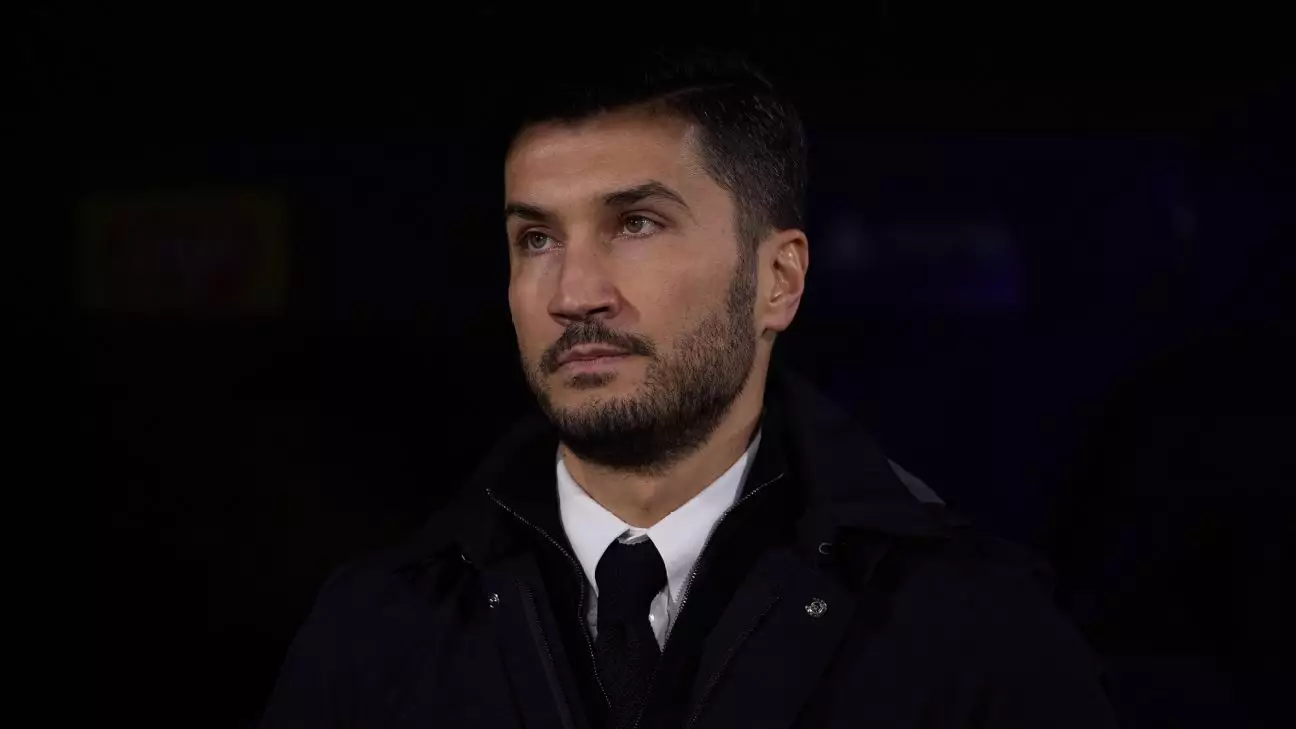In a recent turn of events that shocked fans and analysts alike, Borussia Dortmund parted ways with Nuri Şahin, who took over managerial duties from Edin Terzić just a little over a year ago. The club’s decision to appoint Şahin reflected a hopeful yet misguided belief that he could reshape the team’s identity following Terzić’s tenure. Instead, the current situation reveals an unsettling reality—the club has slipped further down the standings, culminating in an alarming sixth consecutive defeat across competitions, drawing scrutiny from all corners of the footballing world. With Şahin’s departure, the club now faces a crossroads that might determine its future trajectory.
Dortmund’s Decline: A Statistical Nightmare
Since Şahin’s ascension to the managerial role, Dortmund’s expected resurgence has faltered. Following their latest setback—a disappointing 2-1 defeat to Bologna—the team finds itself languishing at 13th in the UEFA Champions League group stage. Yet, it is the club’s Bundesliga performance that paints a more dire picture. A string of losses against teams like Bayer Leverkusen and Eintracht Frankfurt dropped Dortmund further to 10th place, a staggering 20 points behind the table-toppers, Bayern Munich. Such statistics reveal a deeper malaise that transcends mere numbers; they point to a systemic failure that raises questions about the club’s long-term strategy.
Lars Ricken, Dortmund’s CEO for sport, spoke candidly about the board’s decision to dismiss Şahin: “After four losses in a row and only one win in the past nine games, we unfortunately lost faith in our ability to achieve our goals under the current setup.” The lack of belief permeates through the squad, which reportedly still supported Şahin up until the end. This speaks volumes about the club’s disarray and illustrates that instability breeds distrust, undermining a once-prominent Bundesliga powerhouse. The growing discontent is emblematic of the disconnect between expectations and reality, further compounding the urgent need for change.
The Tactical Confusion: A Retreat to Past Strategies
Upon taking charge, Şahin articulated a vision to reforge Dortmund into a dominant force utilizing possession-based football. However, rather ironically, this vision was quickly abandoned, reverting the team back to Terzić’s reactive style of play. Matches under Şahin often resulted in baffling performances—Dortmund would oscillate between a lackadaisical approach with minimal possession and frustratingly erratic strategies. This inconsistency rendered the team invisible at critical junctures of matches. The Christmas break was anticipated as a moment to recalibrate; instead, it only accelerated their slide, characterized by defensive blunders and a fearful mentality that permeated the squad.
As is often the case in football, the stigma of failure often falls squarely on the shoulders of the manager. Yet, Şahin’s brief tenure is a poignant reminder that systemic issues run deeper. Players like Emre Can and Julian Brandt have consistently underperformed, while the absence of influential figures such as Erling Haaland and Jude Bellingham, alongside the fading impact of veterans like Marco Reus, create palpable voids that no tactical framework can fill. Leadership and recruitment failures have compounded the situation, highlighting that coaching changes alone will not resolve the underlying dysfunction.
In light of Borussia Dortmund’s managerial upheaval, the immediate future looms uncertain. The club reportedly has a shortlist for Şahin’s replacement, notably including names like Niko Kovač, who is known for instilling grit into teams, albeit without particularly dazzling tactical prowess. The hiring of a seasoned figure like Kovač may provide temporary relief but also highlights a troubling tendency toward short-term fixes rather than embarking on a significant overhaul. Continued mediocrity could just as easily result from recycling narratives of change without addressing the foundational issues at play within the squad.
As Borussia Dortmund grapples with the aftermath of Şahin’s departure, the need for deep reflection is paramount. The team, rich in talent yet lacking in cohesion and mental fortitude, must confront the reality of its spiraling performance. Addressing recruitment strategies, fostering a stronger team mentality, and establishing consistent tactics will be vital. The clock is ticking as they navigate a potential repeat of relegation battles—a fate that would be unthinkable for a club of Dortmund’s stature. Only through earnest introspection and decisive action can they hope to reclaim their rightful place at the pinnacle of German football.

Leave a Reply